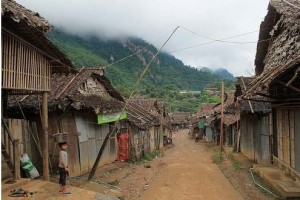Profiling Survey Stokes Refugee Fears
By Burma Partnership • June 24, 2013 Last Thursday, 20 June, marked World Refugee Day and events were held highlighting the plight of refugees throughout the world, including a United Nations High Commissioner for Refugees (UNHCR) organized event held at the Myanmar Peace Centre in Rangoon. According to the UNHCR, there are around 650,000 displaced people in Burma and around 150,000 refugees on the Thailand-Burma border, many of whom were born there. Yet as the discourse from the government of Burma and the international community is moving towards repatriation for those on the border, anxiety is building with refugees worrying that they will be forced to return to a place where they will live in fear of conflict, will have no livelihood opportunities, and no land to call home.
Last Thursday, 20 June, marked World Refugee Day and events were held highlighting the plight of refugees throughout the world, including a United Nations High Commissioner for Refugees (UNHCR) organized event held at the Myanmar Peace Centre in Rangoon. According to the UNHCR, there are around 650,000 displaced people in Burma and around 150,000 refugees on the Thailand-Burma border, many of whom were born there. Yet as the discourse from the government of Burma and the international community is moving towards repatriation for those on the border, anxiety is building with refugees worrying that they will be forced to return to a place where they will live in fear of conflict, will have no livelihood opportunities, and no land to call home.
In recent weeks, a survey initiated by the Thai government and the UNHCR, and implemented by the Mae Fah Luang Foundation, an organization under Thai royal patronage, is being carried out, profiling refugees in Mae La camp. The survey has been heavily criticised as having insufficient input from refugees, and being designed to favour repatriation, and is thus stoking the refugees’ anxiety. The rationale behind the profiling is based on the UNHCR’s “preparation” for return, in that when the conditions for refugee return are right, relevant stakeholders will be sufficiently prepared to assist in a durable return to Burma. According to the UNHCR, “The profiling process will be a fully consultative and participatory process, where the refugees will be involved in every step. The questionnaire will be designed through consultations with the refugees.” Yet the reality of refugees’ participation in the process has been flawed and many refugees feel that the survey reflects a strong preference for return to Burma as the only viable solution, as opposed to staying in Thailand or resettling to a third country.
In response, a petition was started in Mae La refugee camp calling for refugee participation in the design of the survey and changing the current focus of the survey so it does not emphasize the option of returning to Burma. The petition gathered nore than 3,600 signatures and was submitted to the UNHCR. Collection of further signatures was not maintained due to fears of reprisals from camp authorities as well authorities’ interference. A telling criticism of the survey comes from research undertaken by the NGO, Burma Link. They interviewed some of the representatives delegated to conduct the survey by the camp committee. Of those interviewed, 80% walked away from the process after seeing the questions and training manual at a session in April. There have been further concerns with implementation, with refugees feeling that they are pressured to answer questions they do not want to.
Talk of repatriation is causing so much concern because many of the reasons for people fleeing Burma in the first place still exist. Conflict has been a main driver of displacement for decades, but despite tentative agreements between the Burma government and non-state armed groups, clashes continue throughout the country. In the past two months, conflict in Shan State has escalated and the war in Kachin State continued despite the recent peace talks, while in Karen State, just over the border from Mae La refugee camp, the situation remains tense.
Even if conflict ends there are still a plethora of issues that must be addressed. In a recent report released by Displacement Solutions, called “Bridging the HLP Gap,” reform of housing, land and property rights in Burma must be a fundamental part of the return of displaced people as well as part of a sustainable peace solution. Another issue, critical to the sizeable Muslim populations in refugee camps on the border, is the need to address the recent anti-Muslim violence that has spread from Arakan State through central Burma and most recently, in Lashio, Shan State.
While the Thai government and the UNHCR acknowledge that these issues must be resolved before repatriation occurs, the anxiety and fear in the refugee camps about forced return is growing. The implementation of the profiling survey has not included sufficient participation of refugees. While the UNCHR have addressed some of the problematic questions in the survey, more needs to be done to allay fears to assure that these vulnerable people will not be forced to return to a place that they feel they had to flee and that they play a meaningful role in any preparation for their return.
Tags: Burma Partnership, Refugees, Repatriation, UN High Commissioner for RefugeesThis post is in: Blog
Related PostsBurma Partnership Celebrates Continuing Regional Solidarity for Burma and Embraces the Work Ahead for Progressive Voice
Burma Army Displays Blatant Disregard for 21st Century Panglong Peace Process
Ann Din Coal Power Plant: Local Movement and Action to Preserve and Protect Natural Resources and Land: Mon IDP Report Case Study #4
Latest Human Rights Abuse Case Demonstrates Urgent Need to Reform the Myanmar National Human Rights Commission
Human Rights Far From Guaranteed as US Sanctions on Burma Are Removed









 All posts
All posts